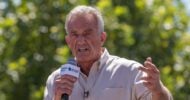I have chronic lymphocytic leukemia, and I do not want anyone to infect me. Because of my leukemia, I have low immunoglobulin levels, so I am extremely cautious. If I were to become infected, it would mean that I did something to put myself in danger. We have been telling people for the last three months to socially distance, but people still want to go to bars and restaurants and sporting events. I want us to do a better job convincing people that they should try harder to avoid being infected.
The newspaper sports pages can give us a view of how the message has not been conveyed. At every level, sports have shut down. Officials are trying to determine how to reopen and do it in a safe way. There is talk about putting athletes into a bubble to keep them from getting infected. That is already proving to be difficult. College athletes and professional baseball players have tested positive for the coronavirus upon reporting to training sites. It shows that something is happening on a widespread scale that puts the athletes at risk. We know that college-age students are not risk-averse and that they will likely behave in ways to put themselves at risk. But what can we say about professional baseball players who are earning hundreds of thousands or millions of dollars a year? Being infected jeopardizes their health, their earnings, and their future, and the infection puts everyone around them at risk. If we cannot convince them to stay safe, what hope do we have for the rest of society?
And there are people who think that it is a good idea to have a political rally in an indoor arena. When masks were handed out in Tulsa, many people threw them away. A quote in the New York Times summarized the attitude of people whose opinions are putting all of us at risk. “It’s all fake. They’re just making the numbers up. I haven’t seen anybody die, not from coronavirus. I don’t even know anybody who’s got it.” When six campaign workers tested positive, an official dismissed it as just six people out of hundreds. He did not say how many hundreds. Two hundred would be three percent. Six hundred would be one percent. But actually, the exact percentage does not matter. The presence of one infected person in a crowd is an emergency. How can we explain that if there is one case in a community, that community is at risk of an outbreak?
Our problem is not only a general distrust of science and public health officials. It is also that many people do not understand data and graphs. Lines on a graph tell a story to people who understand graphs and trust the sources of the data on the graphs. But there is another group for whom this does not work. For them, we need stories, not more data and graphs.
Everything that I have written to this point indicates our collective failure to communicate. We need to find a better way to explain the problem to people who have so far failed to grasp it. For them, we need to tell better stories rather than presenting more data. The power of a story to move public sentiment has just been demonstrated. When one man died after a policeman knelt on his neck, the whole civilized world reacted in outrage. I do not want there to be any coronavirus stories as horrible as that one, but there are already well over a hundred thousand stories to tell about people who have died of COVID. Explaining their stories would be an example of something that has an emotional impact. Their stories could encourage people to follow public health orders so that they would be more careful about avoiding infection. We need more stories that impact people emotionally. Stories, not more data.
David Galinsky is an internal medicine physician and emeritus staff, Lankenau Medical Center.
Image credit: Shutterstock.com





















![Teaching joy transforms the future of medical practice [PODCAST]](https://kevinmd.com/wp-content/uploads/Design-1-1-190x100.jpg)
